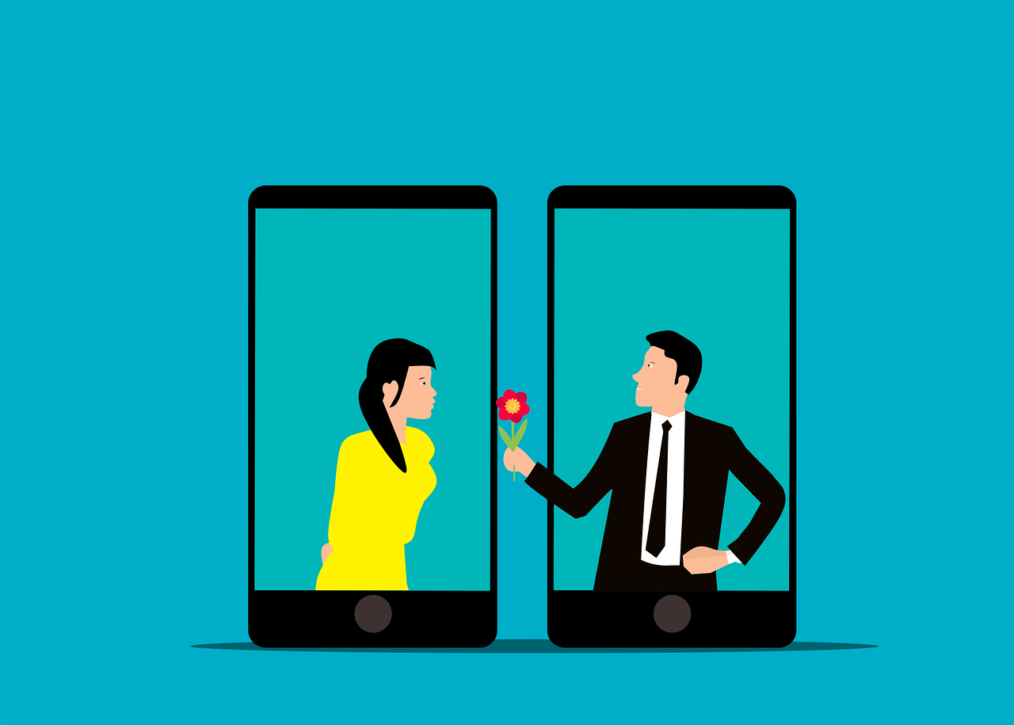
Is love truly more blind than ever? The science behind post-COVID romance
We all have experienced the frustrations of the pandemic, especially when strictly adhering to social distancing measures and not being able to physically meet up with other human beings for the past two years. COVID-19 has rewritten relationships by bringing virtual dating apps into the dating scene in a new fashion: making an unconventional transition from hook-up culture towards a take-it-slow approach to making connections.
As someone who tried their luck (without much success) with dating apps at the start of the pandemic, I kept asking myself one question. “Has love, liking, infatuation, or any form of being “into someone” become more blind than ever?” Looking at the impact of dating platforms like Tinder, Bumble, or Match.com, I wondered if daters like me were capable of establishing authenticity, love, and romance and ended up developing trust and a real deep connection after meeting virtually and then for the first time in person. The truth is, it hasn’t been all roses and butterflies for everyone looking for love out there. Wouldn’t you agree?
According to Pew Research Center, almost 65% of single Americans have expressed exasperation over the difficulties with dating during the pandemic, although many of them indicated an interest in finding a committed relationship. Why so? I could think of a plausible reason: to navigate through a period of such high uncertainty, people yearn for more contact and security promised by the potential romantic plot, often accompanied by ambivalent feelings. For instance, women tend to feel disappointed after failing to fulfill their desire to find “the one” in the big pool of probable matches. The frustration also exacerbates when individuals feel like they are not special enough (“I am too awkward”) for what they expect to be a rom-com kind of encounter with sparks and love at first sight. Thus, dating apps would represent a highly feasible option to find a suitable partner for them. Unlike the usual and quite accidental meet-cutes that happen organically, daters often find the active choice of “searching for love” by swiping or selecting their potential matches online pretty unromantic. But to look at the bright side, virtual apps allow people in a “minority”, such as queer and transgender, to meet their significant others more easily. And those who are naturally more introverted may prefer starting with online interactions and low-key conversations via text messages before plunging into an intimidating face-to-face conversation in the physical world.
To navigate through a period of such high uncertainty, people yearn for more contact and security promised by the potential romantic plot, often accompanied by ambivalent feelings.
Now, let’s consider the two key premises of online dating that might become problematic while making the first impression: self-presentation and self-disclosure. Research has shown that individuals alter the way they present themselves to match their desired prospective dates. Personally speaking, I felt the need to show the best pictures of myself that would increase my chances of getting the right “matches”. Moreover, online interactions often involve a great deal of deception. According to Ellison et al. (2017), 86% of daters felt that others misrepresented their physical appearance, and they also altered some information about their age, marital status, and appearance. Previous research has found daters reporting competing desires, one wanting to present a truthful picture of themselves that battled with their natural tendency to portray an attractive, successful, and desirable persona. This discrepancy between conflicting needs for accurate and positive self-presentation is often resolved by creating a profile depicting their future idealized version of the self.
Research has shown that individuals alter the way they present themselves to match their desired prospective dates. According to Ellison et al. (2017), 86% of daters felt that others misrepresented their physical appearance, age, marital status, and appearance.
Although the profiles on dating apps sometimes involve a certain level of misinformation, individuals who are interested in finding an intimate relationship tend to engage in deliberate self-disclosure online (even more than offline). Since most virtual interactions precede the anticipated face-to-face encounter with a potential romantic partner, open and honest self-disclosures often occur more frequently than deceptive disclosures. In that sense, dating apps have transformed the social-distancing limitations of the pandemic into potential benefits for singles like me. While I don’t have a real success story with an online dating “endgame”, I’ve met some pretty talented and interesting people and gathered funny dating stories!
(…) Individuals who are interested in finding an intimate relationship tend to engage in deliberate self-disclosure online.
Ultimately, dating during the COVID times has brought a lot of new opportunities and positive changes for singles out there. But whether the benefits of online dating outweigh the hardships in online interactions, deception, and the lack of nonverbal communication, I will leave that up to you to judge. In my opinion, there must be a balance between our natural desire for self-presentation, the amount of self-disclosure, our authentic selves, and our expectations about the dating experience before even starting a conversation online.
So, would you agree that love has become even more blind than ever, now that dating apps have become a norm?
References
Brown, A. (2023, April 25). Most Americans who are ‘single and looking’ say dating has been harder during the pandemic. Pew Research Center. https://www.pewresearch.org/short-reads/2022/04/06/most-americans-who-are-single-and-looking-say-dating-has-been-harder-during-the-pandemic/
Collins, L. M. (2022, April 9). Dating during COVID: Pew research shows finding love is harder than ever – Deseret News. Deseret News. https://www.deseret.com/2022/4/9/23012680/dating-among-pandemic-toll-as-coronavirus-sent-finding-a-date-online-pew-american-family-survey
Duguay, S., Dietzel, C., & Myles, D. (2022). The year of the “virtual date”: Reimagining dating app affordances during the COVID-19 pandemic. New Media & Society. https://doi.org/10.1177/14614448211072257
Ellison, N., Heino, R. & Gibbs, J. (2006). Managing Impressions Online: Self-Presentation Processes in the Online Dating Environment, Journal of Computer-Mediated Communication, 11(2), 415–441, https://doi.org/10.1111/j.1083-6101.2006.00020.x
Portolan, L. & McAlister, J. (2022). Jagged Love: Narratives of Romance on Dating Apps during COVID-19. Sexuality & Culture 26, 354–372. https://doi.org/10.1007/s12119-021-09896-9
Note: Featured image by Mohamed Hassan



